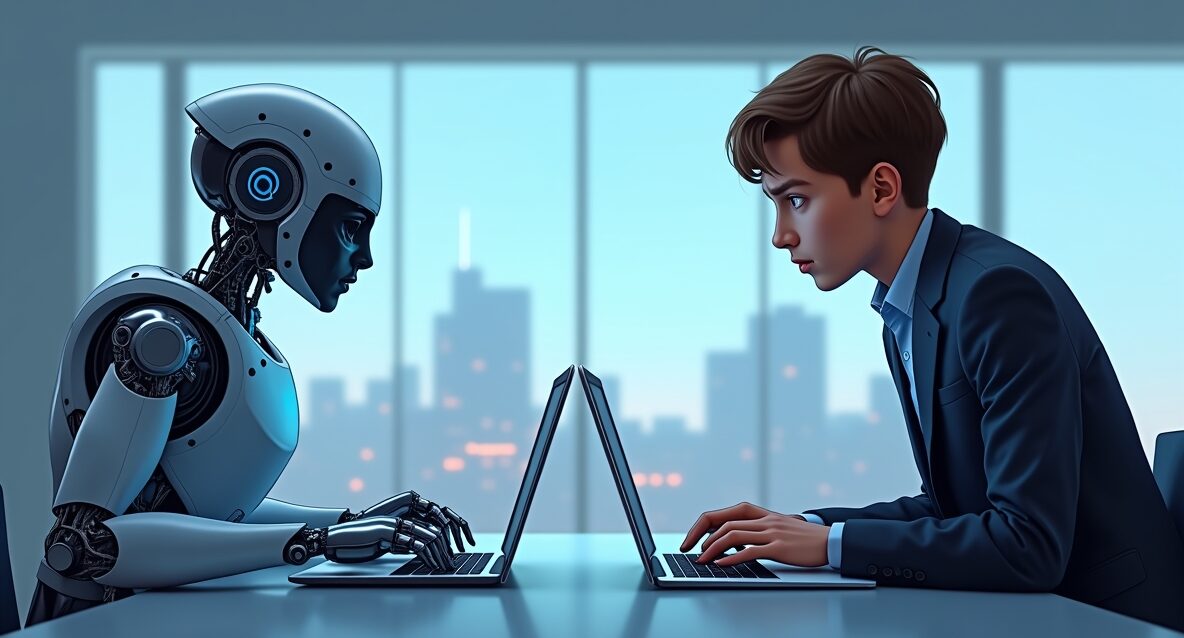As I sit here writing this article—ironically using AI tools to check my grammar—I can’t help but ponder the question that’s keeping many of us awake at night: Will artificial intelligence make human workers obsolete? Let’s dive into this pressing issue, separating fact from fiction, and exploring what the future might actually hold for us mere mortals in the workforce.
The Ghost of Automation Past
Remember when ATMs were supposed to eliminate bank tellers? Well, here’s a fascinating twist—the number of bank tellers actually increased after ATMs became widespread. Why? Because banks could open more branches with lower operating costs, creating different roles for human workers. This pattern of technological advancement creating new opportunities whilst changing existing ones has repeated throughout history.
During the Industrial Revolution, we witnessed similar fears about mechanical looms replacing textile workers. Change happened. Pain followed. Yet humanity adapted, and new jobs emerged that our great-grandparents couldn’t have imagined. Today’s social media managers and app developers would seem like wizardry to workers from the 1800s.
The AI Tsunami: Which Industries Are in the Crosshairs?
According to a recent report from MarketsandMarkets, published in December 2024, AI automation is poised to impact knowledge workers most significantly. The sectors feeling the heat include:
Data entry and processing—these roles are already experiencing significant disruption. Customer service representatives are increasingly working alongside AI chatbots, though interestingly, many companies are finding that a hybrid approach works best. Legal research and basic accounting tasks are being transformed by intelligent software that can process documents in seconds.
But here’s the thing—AI isn’t perfect. Far from it.
AI as a Job Creator: The Silver Lining
Here’s where things get interesting. A fascinating report from Hugging Face’s Enterprise AI Survey (October 2024) revealed that 78% of companies implementing AI solutions actually increased their workforce. They needed people to manage AI systems, train models, and handle the complex ethical implications of AI deployment.
I recently spoke with Sarah, a former insurance claims processor who now works as an “AI-human workflow optimiser”—a job title that didn’t exist three years ago. “I understand both the human element and the AI capabilities,” she told me. “It’s not about replacement; it’s about enhancement.”
The UBI Question: A Safety Net for the AI Age?
As we grapple with these changes, universal basic income has emerged as a hotly debated solution. Several pilot programmes are showing promising results—though it’s worth noting that UBI isn’t a silver bullet. It’s complicated.
The city of Hull’s recent UBI trial (launched in September 2024) offers interesting insights into how such programmes might work in practice. Early results suggest that participants are more likely to pursue additional education or start small businesses—exactly the kind of adaptation we need in an AI-driven economy.
Staying Relevant: Your Game Plan
So, what’s a human to do?
First off, breathe. The sky isn’t falling. Focus on developing skills that AI currently struggles with—emotional intelligence, complex problem-solving, and creative thinking. These abilities remain uniquely human.
Consider this approach:
- Embrace AI as a tool, not a threat. Learn to use AI-powered software in your field.
- Develop your emotional intelligence—it’s your superpower against automation.
- Stay curious and flexible. The jobs of tomorrow might not even exist today.
I’ve recently started learning prompt engineering—something I never imagined would be part of my skill set. It’s fascinating. And terrifying. And exciting.
Looking Ahead: The Human Factor
Here’s my take—mass unemployment isn’t inevitable, but significant disruption is. The key difference lies in how we prepare and adapt. The future workforce will likely be more fluid, with people moving between roles and continuously learning new skills.
Remember this: AI excels at tasks, but humans excel at adaptation. We’re remarkably good at finding new ways to be useful. Time will tell. But one thing’s certain—the future belongs to those who can work alongside AI, not those who try to compete with it.
The reality probably lies somewhere between the apocalyptic predictions and the overly optimistic dismissals. As we navigate this transformation, we need thoughtful policies, innovative education approaches, and—most importantly—a willingness to adapt.
Let’s embrace the change whilst ensuring no one gets left behind. After all, the goal isn’t just to survive the AI revolution—it’s to thrive in it.
What are your thoughts on AI and the future of work? How are you preparing for the changes ahead? Share your experiences in the comments below.




